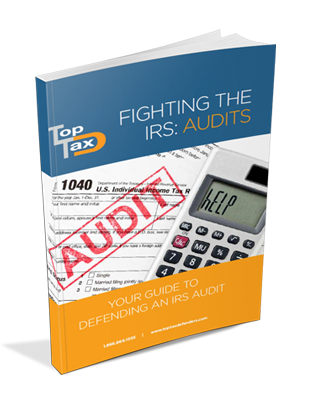Have you received an IRS audit notice? While millions of taxpayers are audited every year, the concept that the IRS would like to take a closer look at your taxes can be nerve-wracking.
>>Click Here For a Complete Guide to the IRS Audit Process
Even taxpayers that have nothing to worry about because they have filed their taxes in a timely and honest manner may be frightened of an impending IRS audit. Hiring a tax resolution company like Top Tax Defenders for audit representations can help ease the anxiety of an IRS tax audit.
Watch Top Tax Defenders CEO Jayson Mullin explain why you don't have to take on the IRS alone.

What does it mean to be audited?
In a nutshell, an IRS audit is when the IRS notifies a person or business, usually by a notice in the mail, that they want to take a closer look at their financial information and records to make sure a filed tax return obeys all tax laws and regulations. Though some audits are done face-to-face, the majority of IRS audits are correspondence audits through the mail.
If your tax return is selected for audit, you may consider hiring audit representation, like Top Tax Defenders. Having professional representation can help you feel assured that you are prepared with necessary documents and filling out any additional paperwork correctly, which can make the audit experience go faster and be completed with fewer headaches.
How long it takes to complete an audit can depend on several things, such as the complexity of the tax return, the extent of issues under review, and the availability of both the taxpayer and IRS personnel. Some audits are finished within a few months while others may go on for a year or longer.
>> Click Here for Your Guide to Defending an IRS Audit
Why was my return selected for audit?
Though we don't know exactly why certain returns are selected for closer examination, there are many factors that seem to contribute to having your return audited, including things like:
- Math errors
- Discrepancies or inconsistencies in reported income
- Being self-employed or owning a business
- Owning foreign assets
- Not reporting income
- Claiming unusually high deductions or credits
- Not having filed returns in past years, especially if your income is over $100,000
- Random selection through the IRS's computerized screening process
Whatever the reason for selection, you have some ability to make the process go more smoothly by addressing any identified issues promptly and transparently. You should respond promptly and respectfully with correct and complete documentation. You should cooperate fully with requests for documentation or information, seeking professional guidance if necessary.
>>Click Here to Learn 10 Easy Ways to Avoid an Audit
How does the IRS conduct an audit?
The Internal Revenue Service (IRS) conducts three main types of audits:
-
Correspondence Audit: Typically 75-85% of all audits are correspondence audits. This type of audit is conducted entirely through mail correspondence. The IRS will send you a letter requesting additional information or clarification on specific items on your tax return, such as deductions or income sources. You respond by providing the requested documentation or explanations.
-
Office Audit: An office audit requires you to meet with an IRS auditor at an IRS office. During the meeting, the auditor will review your tax return and may ask questions or request additional documentation. Office audits typically involve more complex issues than correspondence audits but are less extensive than field audits.
-
Field Audit: A field audit is the most comprehensive and intrusive type of IRS audit. An IRS agent will visit you at your home, place of business, or accountant's office to conduct an in-depth examination of your tax return and financial records. Field audits are typically reserved for cases involving significant discrepancies or suspected tax evasion.
Each type of audit varies in terms of complexity, level of involvement required from the you, and the potential for scrutiny of financial records.
>>Click Here to Learn How to Deal with a Correspondence Audit
What will the IRS expect during an audit?
You will be notified of what documentation the IRS would like beforehand, so that you may prepare for a face-to-face meeting, or fill out correspondence audit paperwork. The IRS may be examining the entirety of your return, or they may only want clarification for a specific part of the return. For example, if you own a small business and have been continuously reporting a loss, and therefore no tax liability, for the business, the IRS may want further proof of your losses. This could include everything from rent receipts and utility statements, to a detailed record of customer billings.

What documentation will the IRS need during an audit?
You should organize and prepare several pieces of documentation after you receive notification of an audit. Some of the documentation that you might be asked to supply the auditor with include:
- W-2s, 1099s, or other earning statements
- bank records
- records of dividends and interest
- proof of expenses, deductions, and exemptions
- records of contributions to charities, retirement accounts, and other non-taxable funds
If you are missing any records, you should find or replace the missing records as quickly as you can, particularly those that should have been submitted with the tax return being audited. You should provide copies of any records requested and keep the originals for your own use.
>>Click Here to Learn More About What to Expect During an Audit
I'm not sure I can handle this on my own. What should I know about hiring representation for my audit?
Though you do not have to hire anyone to represent you in an IRS audit, depending on the complexity of the case and the issues involved, having a professional on your side can take the stress out of an audit situation. Here are some of the tax professionals that offer unlimited representation with the IRS:
- Tax Attorneys: Tax attorneys specialize in tax law and legal matters, providing in-depth knowledge of tax codes, regulations, and litigation. If your case might require you to appear in court or may involve litigation, a tax attorney is the right choice. Also, communication with tax attorneys is protected by attorney-client privilege, so you can enjoy protected confidentiality. Tax attorneys are also well-equipped to handle complex tax issues, legal disputes, and negotiations with the IRS.
- CPAs: CPAs are trained in accounting principles and tax preparation, offering comprehensive financial advice and assistance. They can assist you in organizing your financial records, preparing your tax returns, and ensuring compliance with tax laws. CPAs are also able to represent you during an IRS audit, providing explanations, supporting documentation, and negotiating with IRS agents
- Enrolled Agents: EAs are authorized by the IRS to help with audits. They offer expertise in tax preparation, planning, and representation, specifically before the IRS. They can help you with tax compliance issues, such as filing delinquent returns or resolving tax disputes.
Choosing the right representation depends on the complexity of your tax situation, the nature of the audit, and your preferences for legal versus financial expertise. In some cases, a combination of these professionals may be beneficial for comprehensive representation during an IRS audit. Top Tax Defenders has all these types of experts who can help with your tax audit.
>>Click Here for Tips on Hiring Audit Representation
What happens after the audit?
Most audits end in a change to the return. This could be in favor of the taxpayer, or the IRS; the IRS does not necessarily target taxpayers that may owe them more money. You could walk away from an IRS audit being owed additional tax refund money.
While only about one percent of taxpayers are audited per year, you may find yourself in that minority. Instead of going through the stressful process of an IRS audit alone, seek audit representation from an experienced tax firm. Top Tax Defenders has 27 years of experience with the IRS, and knows what to expect from an audit.
>>Click Here to Read Real-Life Success Stories from Our Clients









